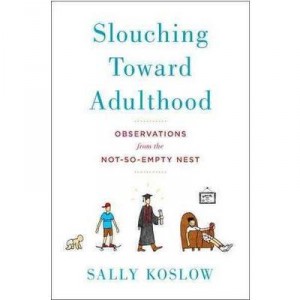Understanding the President
August 13th, 2012 // 11:43 am @ Oliver DeMille
 One way to understand current events is to take a long view of the major historical trends at play, and another is to clearly define the systemic forces that influence what is going on.
One way to understand current events is to take a long view of the major historical trends at play, and another is to clearly define the systemic forces that influence what is going on.
A third is to learn about the character of the leaders who shape policy and especially those who have the power to make decisions that change society.
This third method may be the least accurate at predicting the years ahead, but it is often the most interesting of the three.
David Maraniss has helped Americans understand the character of our current President in his new book, Barack Obama: The Story.
Maraniss is a Pulitzer Prize-winning biographer, and he tells us several key traits that help us understand our top executive.
For example, according to Maraniss, Barack Obama is loathe to take risks until he has thought through every detail.
As a result, he avoids taking many risks, but often ends up taking a big risk when time runs out and he must act.
Thus his presidency has consisted of few singles or doubles, to use a baseball analogy, but a few well-placed homeruns such as passing health care and executing Osama bin Laden.
This methodology gives his critics evidence of a president lacking in consistent leadership and bungling too many things as the months pass, and it provides his supporters with a list of significant successes that only a truly top achiever could attain.
Thus the critics brush away his homeruns as anomalies, while his supporters see the months where little is accomplished as prelude to great strokes of leadership.
***********************************
 Oliver DeMille is the chairman of the Center for Social Leadership and co-creator of Thomas Jefferson Education.
Oliver DeMille is the chairman of the Center for Social Leadership and co-creator of Thomas Jefferson Education.
He is the author of A Thomas Jefferson Education: Teaching a Generation of Leaders for the 21st Century, and The Coming Aristocracy: Education & the Future of Freedom.
Oliver is dedicated to promoting freedom through leadership education. He and his wife Rachel are raising their eight children in Cedar City, Utah.
Category : Blog &Book Reviews &Current Events &Government &Leadership &Politics
The Adultescent Phase
July 14th, 2012 // 3:15 pm @ Oliver DeMille
 With more and more college graduates returning home to live with their parents, many adults are becoming frustrated with the rising generation.
With more and more college graduates returning home to live with their parents, many adults are becoming frustrated with the rising generation.
In the book Slouching Toward Adulthood, Sally Koslow shows how this trend is the natural result of the last two generations of parenting.
The problem is not so much the slumped economy and high unemployment, although these are realities, but the fact that using student loans to get through college is now the norm, so when students graduate they are loaded with debt and many can’t afford rent.
Even more difficult, the Boomer generation tended to bring up their children with an attitude that left little room for the lessons learned from failure.
This was mixed with a strangely controlling approach to scheduling and achievement.
As reviewer Judith Newman wrote in People (July 9, 2012):
“Recognize that channel-surfing, chips-snacking lump on the couch? It might well be your adult child. Koslow writes wittily about the infantilization of American youth as increasing numbers treat getting a job and moving out as just an option. The solution? Stop trying to inculcate our kids against failure, for starters.”
Koslow wrote the book in response to frustrations with her own sons.
One of them was a college graduate, twenty-five year old in her home who frequently slept until noon and then played with friends for the rest of the day and most of the night.
Over six million adult children now live with their parents, pay no rent, eat without limits from their parents’ fridge, and use the house, yard, cable and computers without paying for them.
Many consider their parents an ATM.
Moreover, very few of them are out actively seeking employment.
The irony, Koslow notes, is that most of these adults were raised in a culture where they were constantly told they were special.
The result is that they value having fun with friends, want to travel extensively, and look down on working for the money to pay for their lives, hobbies and interests.
Many of the generation see themselves as free spirits, but unlike the sixties generation they want the expensive yuppie lifestyles of freeloaders.
As Diedre Donahue put it in USA Today,
“The adults aren’t helping. Koslow believes parents often infantilize their adult children because it makes parents feel needed. The result: entitled but incompetent children and exploited but enabling adults.”
Of course, this doesn’t describe the entire generation, or even a majority of them, but it does accurately depict far too many.
This new adultescent trend, as Koslow calls it, doesn’t show any likelihood of slowing in the years ahead. If anything, it will likely increase.
Koslow writes of her own generation, the parents:
“The boomer generation, with its idiomatic immaturity and fury at the very idea that we have to age, is in no small part to blame for adultescents feeling as if there will always be time to break up with one more partner or employer, to search for someone or something better, to get another degree or to surf another couch, to wait around to reproduce.
“Thanks to our parents listening to Dr. Benjamin Spock and to us sucking up to TV ads that pandered to our kiddie greed, we established the model of unprecedented self-involvement, enhanced by our ceaseless boasting.”
As if that’s not enough, the new generation of adultescents “…crave attention and often cash from parents, whom they frequently ask to help them move from place to place; create a mess; rack up debt…”
Then, all too often, they blame their parents for their plight, anxiety, and lack of opportunity.
Koslow’s own sons have now moved away from home and on to adult lives, much to the relief of any reader who has adult children, and in most cases the adultescent phase does eventually pass even if it takes about a decade longer than it used to.
The Boomer system of consistent coddling has borne dismal results.
Sadly, the Tiger Mom approach to forced excellence and settling for nothing but top achievement also often results in adultescentism.
In contrast, helping young people take responsibility for their own learning, careers and lives right from the beginning pays off when they are adults.
Leadership education works.
The economy is difficult, jobs are scarcer than in three generations, and the feelings of youth entitlement at are a century (perhaps all-time) high.
But those with a leadership education know that they have a life mission and need to use initiative, innovation, ingenuity and tenacity to rise to their potential.
They may still want to join their generation and experience an adultescent phase, but in most cases it will be much shorter than that of their peers.
Maybe the best thing about this book is that it is all shared with a hilarious sense of humor. It’s not stressful, it’s fun.
So smile and enjoy your adult kids’ time with you. Give them real chores and rules in the home.
It’s your home, after all.
The key to helping the kids become adults is to be one yourself.
Oh, and charge them rent or have them work it off in equivalent ways. They’re adults, and treating them like it is a sign of respect.
***********************************
 Oliver DeMille is the chairman of the Center for Social Leadership and co-creator of Thomas Jefferson Education.
Oliver DeMille is the chairman of the Center for Social Leadership and co-creator of Thomas Jefferson Education.
He is the author of A Thomas Jefferson Education: Teaching a Generation of Leaders for the 21st Century, and The Coming Aristocracy: Education & the Future of Freedom.
Oliver is dedicated to promoting freedom through leadership education. He and his wife Rachel are raising their eight children in Cedar City, Utah.
Category : Blog &Book Reviews &Culture &Family &Featured &Generations
The French Way
June 16th, 2012 // 5:45 pm @ Oliver DeMille
 Many people around the world are discovering the principles of great education that those using TJEd are already applying.
Many people around the world are discovering the principles of great education that those using TJEd are already applying.
The conveyor belt approach to learning has two big competitors in this second decade of the twenty-first century.
The first can be summed up as, “Don’t just participate in the conveyor belt, excel at it!”
This is the idea widely popularized in the Tiger Mom book and debate which swept through American education circles during the past two years.
The second approach, the one adopted by Montessori, TJEd, and several other highly-effective educational viewpoints recently gained another proponent.
In the enjoyable book, Bringing Up Bébé by Pamela Druckerman, we learn about the core principles of parenting used by French parents.
Those familiar with TJEd will find many old friends among the French techniques, and all of us can learn from these ideas.
For example, according to Druckerman, here are some of the “secrets” of effective parenting widely utilized in the French culture:
- A focus on parenting as a pleasure rather than a chore or grind
- An emphasis on helping children experience growing up as a joy rather than a job
- Taking it slow and enjoying the journey rather than rushing to stay ahead of the neighbors’ kids or meet standards set by unnamed experts
- “Establishing firm but gentle authority…”
- “Favoring creative play over lots of lessons…”
- “Never letting a child become the center of your existence”
- Realizing that children aren’t “projects for their parents to perfect. They are separate and capable, with their own tastes…”
“French parents just don’t seem so anxious for their kids to get head starts,” Druckerman tells us, but rather help them experience quality in growing up and learning.
The focus is more on the current goal of being happy children and the end goal of becoming well-adjusted adults than on striving for adult goals as toddlers and young children.
Throughout the book, those using TJEd will find familiar themes couched in an interesting European experience.
The following ideas show up repeatedly and in new and interesting ways: classics; mentors; structure time, not content; you, not them; simple, not complex; quality, not conformity; secure, not stressed; teach to the appropriate phase, not one-size-fits-all education; personalize, instead of joining the conveyor belt.
Above all, Druckerman emphasizes the French emphasis on wisdom (rather than grades, gold stars, or other external accolades) as the central purpose of learning, and for that matter of family and life.
The fact that Druckerman is an American who learned these principles while living in France adds to the book—it is practical in the American way while being idealistic and even artistic in the French way.
In short, it’s a great read, even if you don’t use TJEd but especially if you do!
Category : Blog &Book Reviews &Education &Family &Featured
Next…?
May 14th, 2012 // 10:16 am @ Oliver DeMille
THE NEXT BIG TREND: Pooled Sovereignty
by Oliver DeMille
I recently spent two days in a Barnes and Noble reading the bestsellers on current trends and issues. I do this as often as I can—at least three times a year.
Sometimes I emphasize business bestsellers, and other times I focus on political books.
When I was too ill to do these visits for a time, I used Amazon to order the bestsellers every four months. But I prefer the bookstore, because in addition to books it has all the leading periodicals.
How to Read a Book(store) in 4 Easy Steps
I usually find a comfortable chair and stack 20-30 volumes and magazines on the table or floor next to me. Then I skim everything that looks interesting. That’s Step 1.
Step 2 consists of reading the books and articles that really pique my interest. I read them closely, and take notes in my notebook. Step 2 takes at least three hours and sometimes a lot more. If needed, I go back for a second day of reading.
Step 3 is buying the books and periodicals I want to have in my personal library, and Step 4 is re-reading them and organizing my notes from the trip and writing as needed.
On this trip, my travel plans got delayed, so I ended up staying longer than expected. I perused the business bestsellers and added more books to Step 2. Then I skipped to Step 4 and studied three books I’d already read over the last two days.
When I do these bookstore research trips, I’m always looking for something special. I want to see developing trends, new directions, and significant key words that signal where cutting-edge thought is headed. Only once in a while do I find a truly Big Trend, one which promises to remake the future. “Pooled Sovereignty” is just this kind of trend.
Sovereignty Broken Down
Sovereignty is the final say on something, or, having the ultimate power. The American framers were so concerned with the abuses caused by the limitless power of the British government that they established America with split sovereignty.
This meant that the federal government had just twenty powers, all listed and numbered in Article I, Section 8 of the Constitution. The final say, or sovereignty, over everything else was left to the states, or to the people – and the states were limited in their respective constitutions.
The people were ultimately sovereign.
Moreover, just in case the federal government tried to ignore the Constitution and usurp sovereignty from the states and the people, the framers divided the smaller portion of sovereignty given to Washington D.C. into three branches and established checks and balances to keep too much power from accumulating in any one place.
For decades scholars, students and interested citizens from both Left and Right have warned that sovereignty is centralizing in Washington, that split sovereignty is being replaced by a massive centralized sovereignty—all power in one place.
Pooled sovereignty is even worse. This occurs where international organizations or treaties make the final decisions for the people, regardless of what national governments say. Indeed, some of the most damaging choices being made today are decided without the consent of Congress or the Supreme Court – not to mention the states or the people. They are made by treaties, the United Nations, G-20, World Bank, International Monetary Fund and other international organizations.
Most Americans turn off their thinking when they hear this list of international agencies—but the elite perk up with interest. This is where the buzz is.
The breeding ground for a global system that supports pooled sovereignty is found in top universities, and it is promoted by the bureaucratic elite in many nations. Much of what occurs in Washington only makes sense to those who understand this drift toward globalization.
The Grand Design
For example, a push for increased government spending, debt and regulation on small business (even in the face of recession and a struggling economy) make perfect sense if the goal is to shift the American economy away from international leadership to global participation—to make the U.S. economy and government more like those of Europe and Asia.
Stimulus, universal health care, less entrepreneurship (through increased levels of government regulation)—all are necessary to create an American economy that can fit seamlessly with the industrialized European/Asian nations.
Another step in this process is to end the use of the U.S. dollar as the world’s reserve currency and replace it with an IMF or other currency. The IMF has already proposed this change, and international support for it is growing.
Just to be clear: When the dollar replaced the British pound as the world’s reserve currency in the 1970s, the average net worth of nearly every home in Britain fell more than 30% the day after the change. The British economy has still never fully recovered, nearly forty years later.
If the same change comes to the U.S., we will likely experience a worse economy for the next four decades than we have over the past four years.
Unfortunately, as Forbes reported, “It’s hard for the State Department to imagine an international agreement to which America is not part.”[i] Republican and Democratic presidents since FDR have drastically decreased American freedom using treaties. This is bad for Americans, good for pooled sovereignty.
Ultimately, there are two types of leadership that can turn this around: presidential leadership, and citizen leadership.
We Need You to Lead Us
Sadly, few presidential candidates (from either party) and exactly zero elected presidents since 1959 have effectively pushed back against this growing threat.
As for the American citizenry leading the charge: find out what percentage of your friends can tell you the details in the Law of the Sea Treaty, the Rome Statute, or UN Agenda 21, and that is a predictor of how likely the people are to effectively lead.
In fact, this lack of citizen leadership means there is little incentive for presidents to take action against pooled sovereignty. Or to put this in practical terms, a half-century with a bad economy is likely ahead.
Unless something changes…
We need citizens who study what our government is doing, who read treaties and court cases and executive orders, etc. Without this, the age of American prosperity will continue to decline.
Where to start? The three books I closely studied at Barnes and Noble are an excellent beginning. If you are liberal, try Drift by Rachel Maddow. Conservatives will probably prefer Dick Morris’s book Screwed. If you’re an independent, read them both. In addition, everyone should read How Do You Kill a Million People by Andy Andrews. Just reading these books and the documents they cite would be a great study on current America.
The future belongs to our citizens—and the level of our citizenship will determine what happens in the years and decades ahead. If we are Type B citizens (who vote, go to jury duty, and watch the news), we’re going to witness the decay of American freedom and prosperity.
We need Type A citizens, who in addition to voting and jury duty also deeply study the issues, government documents and decisions our government officials are making. We can only influence things if we know what’s really happening.
And: Next?
The second day at Barnes and Noble, the intercom announced that children’s reading time was starting. I took a break from reading and walked over to see America’s future. One mother brought her small son, and she read a thick book while he enjoyed reading hour alone. I was surprised they went ahead with the reading hour when only one child showed up. I don’t know why others didn’t bring their children, and I wonder what kind of America this boy and his peers will inherit.
I asked his mother what book she was reading. It was titled—no lie—City of Lost Souls. I wish that boy had been joined by an army of his peers—preparing to lead.
All through history, free people have been nations of readers. When the people oversee the government, they remain free. When they don’t…

[i] Quoted in Screwed: How Foreign Countries are Ripping America Off and Plundering Our Economy – and How Our Leaders Help Them Do It by Dick Morris and Eileen McGann, HarperCollins, May 8, 2012.
Category : Aristocracy &Blog &Book Reviews &Citizenship &Constitution &Current Events &Foreign Affairs &Government &Independents &Leadership &Statesmanship
TJEd and the “French Way”
May 14th, 2012 // 7:46 am @ Oliver DeMille
A book review of Druckerman’s Bringing up Bébé
 Many people around the world are discovering principles of great education that those using TJEd are already applying. The “conveyor belt” approach to learning has two big competitors in this second decade of the twenty-first century.
Many people around the world are discovering principles of great education that those using TJEd are already applying. The “conveyor belt” approach to learning has two big competitors in this second decade of the twenty-first century.
I Can Conform Better Than You Can
The first can be summed up as, “Don’t just participate in the conveyor belt — excel at it!” This is the idea widely popularized in the Tiger Mom book[i] and debate that swept through American education circles during the past two years.
The second approach, the one adopted by Montessori, TJEd and other highly-effective educational viewpoints, recently gained another proponent. In the enjoyable book Bringing Up Bébé by Pamela Druckerman, we learn about core principles the author observed in the parenting philosophy and style of French parents. Those familiar with TJEd will hear a familiar ring to these “French” techniques, and all of us can learn from these ideas.
 Les Sept Clés
Les Sept Clés
For example, according to Druckerman, here are some of the “secrets” of effective parenting widely utilized in the French culture:
- A focus on parenting as a pleasure rather than a chore or grind
- An emphasis on helping children experience growing up as a joy rather than a job
- Taking it slow and enjoying the journey rather than rushing to stay ahead of the neighbors’ kids or meet standards set by unnamed experts
- “Establishing firm but gentle authority…”
- “Favoring creative play over lots of lessons…”
- “Never letting a child become the center of your existence”[ii]
- Realizing that children aren’t “projects for their parents to perfect. They are separate and capable, with their own tastes…”[iii]
“French parents just don’t seem so anxious for their kids to get head starts,” Druckerman tells us, but rather help them experience quality in growing up and learning.[iv] The focus is more on the current goal of being happy children and the end goal of becoming well-adjusted adults than on striving for adult goals as toddlers and young children.
Throughout the book, those using TJEd will find familiar themes couched in an evocative European experience. The following ideas show up repeatedly and in new and interesting ways:
- Classics
- Mentors
- Structure time, not content
- You, not them
- Simple, not complex
- Quality, not conformity
- Secure, not stressed
- Teach to the appropriate phase, not one-size-fits-all education
- Personalize, instead of joining the conveyor belt
Above all, Druckerman highlights the French emphasis on wisdom[iv] (rather than grades, gold stars, or other external accolades) as the central purpose of learning — and for that matter, of family and life.
The fact that Druckerman is an American who learned these principles while living in France adds to the flavor—it is practical in the “American” sort of way while being idealistic and even artistic in the French way. In short, it’s a great read, even if you don’t use TJEd but especially if you do!
[ii] See “Books: Bringing up Bébé by Pamela Druckerman,” Reviewed by Kim Hubbard, People, February 20,2012.
[iii] Pamela Druckerman, Bringing up Bébé.
[iv] Ibid.
Category : Blog &Book Reviews &Education &Family &Featured











